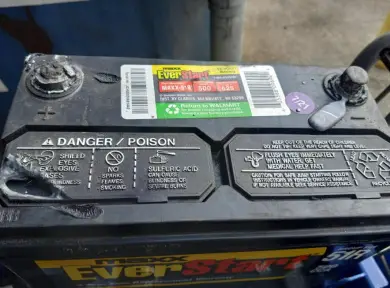
Under ideal conditions, a car battery lasts just under five years before it needs to be replaced. However, in some cases, a premature failure may occur, the causes of which we have summarized for you in our guide.
Symptoms of a Faulty Car Battery
Typically, there is a difficulty in starting the engine, or it may not start at all. Common accompanying symptoms include a non-functional central locking system, necessitating manual unlocking of the doors. Additionally, the theft protection system may fail.
Occasionally, unusual error messages may appear on the onboard computer, such as a malfunctioning airbag or Electronic Stability Program (ESP). In vehicles with automatic transmission, it may happen that the gears do not shift properly or the gear selector cannot be operated before driving. Fluctuations in engine speed can also be noticed while driving.
Causes of a Faulty Car Battery

- Short Charging: Short-distance driving with many stops in the city. This is particularly frustrating in premium vehicles, as the power consumption after turning off the engine is significantly higher due to a large number of power consumers. Many cars do not completely shut down until about 30 minutes after the engine is turned off.
- Extreme Temperatures: Both cold and heat can drastically reduce the lifespan of a car battery.
- Incorrect Car Battery: If the vehicle requires a specific type of car battery (e.g., for start-stop systems) and another is used instead, this can lead to early battery failure.
- Frequent Engine Starts: Starting the engine places the greatest strain on the car battery (from 150 to 600 amps), as the starter motor must bring the crankshaft to a speed of 40 to 100 RPM in gasoline engines and 100 to 200 RPM in diesel vehicles.
- Using the Battery with the Engine Off: If the ignition is on and the radio and/or lights are used for extended periods (e.g., at a drive-in cinema), this often leads to the discharge of the car battery, especially if it is older and not in top condition.
- Faulty Alternator: If the alternator is defective, the car battery cannot be recharged while driving.
- Dirt: The battery housing should remain clean. If moist mud is present on the surface of the housing, it can cause short circuits, leading to a rapid discharge of the car battery.
Cold Temperatures Affect Performance
Temperature fluctuations have a significant impact on the operation and performance of the battery. The efficiency decreases at lower ambient temperatures due to the lower electrolyte density. Low temperatures have a negative impact on battery performance and additionally increase the power demand.
For example, a battery at an ambient temperature of 77 degrees Fahrenheit has an efficiency of 100 percent – but when it drops to the freezing point, the efficiency is about 80 percent, and at -4 degrees Fahrenheit, it's only 50 percent.
Faulty Car Battery - How To Fix?

Modern car batteries can handle longer periods of inactivity well (up to six months), so a vacation should not be a problem. However, the battery's charge state should be checked occasionally with a multimeter – if the voltage falls below 12.4 volts, it is necessary to recharge the battery promptly to prevent possible damage.
Jumper cables should also be kept in the car to borrow the necessary power to start the engine in an emergency. With a jump starter (also known as a Jump-Pack), the need for a second vehicle is even eliminated, though attention must be paid to the engine displacement limit specified by the manufacturer.
If the first symptoms of a faulty car battery appear, it is advisable to consider replacing it early to avoid being stranded at an inconvenient time.
See also:
Same articles

Understanding Vehicle Inspection and Verification Services: Why They Matter for Every Driver
GuidesVehicle inspection and verification services are an essential but often overlooked part of keeping roads safe and cars legally compliant. Most people only think about inspections when it’s...
KLIFEX Brand Overview: High-Quality Automotive Repair Kits for Affordable Repairs
GuidesThe automotive aftermarket has long needed solutions that combine reliability, durability, and affordability. Many car enthusiasts and services are looking for a way...
Fast, Reliable Vehicle Emissions & Inspection Services Made Simple
GuidesFast, reliable emissions and inspection services are essential for keeping vehicles road-ready, compliant with environmental regulations, and safe for daily driving. If you’re looking for quick...

